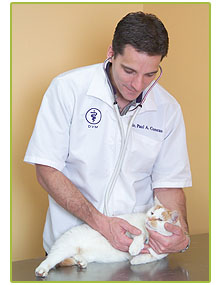
Pets are enjoying longer life spans than ever before partly because of better nutrition, medications, vaccines and advances in medicine and surgery. Regular check ups are a vital component to your pets well being. Annual pet exams help establish a baseline for your pet’s weight, temperature, heart and respiratory rates and many other things. A complete nose to tail exam is done to cover all the bases since our patients do not always tell us where it hurts. Laboratory testing of the blood, urine and feces help to give a look on the inside of your pet for early signs of many diseases such as diabetes, kidney and thyroid disease, hormone imbalances, infections and many more.
Vaccinations play a key role in keeping your pet and family safe from diseases in our environment. Vaccines are categorized as core and non-core.
Core vaccines include Rabies and Distemper for dogs, cats and ferrets. There no approved Rabies vaccine for rabbits or guinea pigs. Distemper vaccine actually protects for at least 4 separate diseases in dogs and 3 in cats. It is given in a series of shots when you have a puppy or kitten, then boostered on a recurring schedule in the years ahead according to your pets lifestyle. Rabies vaccine is required by state law for all dogs, cats and ferrets even if they only stay indoors.
Non-core vaccines are selected according to your pet’s potential exposure to those diseases. These vaccines include Bordetella, Leptospirosis,and Lyme for dogs and Feline Leukemia for cats.
A microchip is a unique permanent form of identification for your pet. It is only about the size of a grain of rice and it is placed under the skin over the shoulders. You register the ID number of the chip with the company so they can contact you if your pet is found.
If your pet is lost and brought to a shelter or veterinary hospital, a scanner can identify the chip’s number. We have seen great success over they years with lost pets being reunited with their owners.
Senior Pet Care
Pets age much faster than people. Our pets have unique needs that may require additional care to keep them comfortable. Many diseases mask themselves in subtle ways that may make it appear that it is just getting old. A geriatric age is different for cats and dogs. It also varies by breed and size of dog. Generally, the larger the dog, the quicker it ages. So a Great Dane may be considered a geriatric a 4 or 5 years and a Chihuahua may not reach that until he is 8 or 9 years. Most cats may be considered middle age by 7 or 8 years.
This is where physical exams twice a year can help. Remember pets age so much quicker than we do, so one year is equal to several years in a human.
Our senior head to tail exam includes all the following:
- Eyes: Examined for eyelid tumors, eyelid defects, dry eye, corneal damage, cataracts, glaucoma, and visual impairments.
- Ears: Ear canals and ear drums are inspected for infection, tumors or hearing impairment.
- Nose: Nasal passages are inspected
- Throat: The throat is palpated for abnormal masses or muscle atropy
- Heart: The heart sounds, rate and rhythm are checked.
- Lungs: The respiratory sounds and rate are checked
- Gastrointestinal: The entire abdominal cavity is palpated for organ enlargement, improper positioning or pain.
- Urinary: The urinary tract is examined to signs of kidney disease, bladder or genital problems.
- Lymph Nodes: All peripheral lymph nodes are palpated for changes in size and texture
- Muscles/Bones: The muscles, bones and joints are palpated for atrophy, range of motion, swelling or instability.
- Skin: The skin is the largest organ of the body and can often show clues to the overall health including infections and hormonal imbalances.
- Neurological: Motor and sensory reflexes are tested
- Laboratory Testing: Blood testing for the complete blood count of the red and white blood cells. Blood chemistry testing to evaluate organ functions. Urinalysis checks for urinary tract disease. Thyroid function is a test for body metabolism. Blood pressure is measured just like in people. Intestinal parasite examination checks for stomach and intestinal worms, some of which are contagious to people.
Routine eye exams are very important. We are well equipped to check for many eye related issues including glaucoma, cataracts, uveitis, corneal ulcers, dry eye and other problems.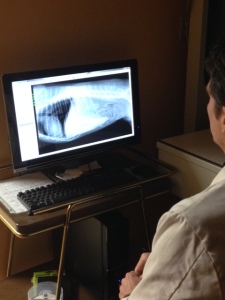 Digital Radiology
Digital Radiology
We only use advanced digital radiography for all our diagnostic needs. Digital radiography is quick and uses less radiation which is great for your pet and the staff assisting with the exposure. There are no chemicals to dispose, so this is great for the environment. Images can be copied or sent to a referral center if your pet needs specialized follow up care.

This is a great non-invasive test that gives a unique look at all the internal organs in remarkable detail by using sound waves. It is often used in conjunction with digital radiographs to help diagnose many internal conditions, such as pancreatitis, diseases of the gall bladder, stomach, kidney, liver, intestines, urinary bladder, adrenal glands and heart. The other great benefit is that it can be performed in any cooperative patient while they are awake lying on a nice soft blanket.
Our surgical service is well equipped to perform a wide variety of soft tissue and orthopedic surgeries. It is staffed by surgeons and technicians with over 25 years of experience. We have advanced anesthetic and monitoring equipment. Our patients comfort and safety is our top concern.
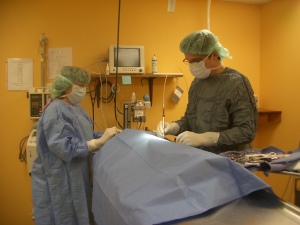 Every pet scheduled for surgery is given a complete preoperative examination by the surgeon. Laboratory tests are evaluated if indicated. Pain relief medication is administered and an intravenous catheter is placed. Anesthesia induction is started to make your pet feel like taking a nap. Anesthetic gas and oxygen are delivered through an endotracheal tube. Patient monitoring is non stop in several ways. First we have a trained technician monitoring anesthetic levels along with the heart and respiratory rates. Monitoring machines record the blood pressure, electrocardiogram, pulse, blood oxygen level, temperature and respirations. IV fluids are given during the procedure to maintain hydration.
Every pet scheduled for surgery is given a complete preoperative examination by the surgeon. Laboratory tests are evaluated if indicated. Pain relief medication is administered and an intravenous catheter is placed. Anesthesia induction is started to make your pet feel like taking a nap. Anesthetic gas and oxygen are delivered through an endotracheal tube. Patient monitoring is non stop in several ways. First we have a trained technician monitoring anesthetic levels along with the heart and respiratory rates. Monitoring machines record the blood pressure, electrocardiogram, pulse, blood oxygen level, temperature and respirations. IV fluids are given during the procedure to maintain hydration.
We use a Carbon Dioxide Laser for selected surgical procedures. There are many benefits including less pain, less swelling and bleeding. For more information check this link……. laser surgery and the benefits it provides to your pet.
Some of the many surgical procedures performed include:
- Spay
- Neuter
- Stenotic nares repair
- Elongated soft palate repair
- Entropion repair, distichiae removal
- Eyelid tumor removal
- Cherry eye repair
- Keratotomy
- Tumor removal
- Aural hematoma repair
- Thyroidectomy
- Vulvoplasty
- Perineal urethrostomy
- Herina repair
- Gastroentestinal surgery
- Cystotomy
- Patella luxation repair
- Anterior cruciate repair
- Dental extractions
- Foreign body removal in stomach and intestines
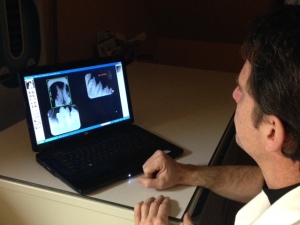 Dentistry
Dentistry
Halitosis or bad breath is one of the most common results of gingivitis and periodontal disease. Periodontal disease is a number one cause of infectious disease in pets. It affects all the supporting structures of the teeth. Bacteria and salivary proteins stick to the surface of the tooth and form a biofilm that is the beginning of tartar build up on the teeth. Bacteria can now have easy access to the blood stream and then in turn to vital organs such as the heart, liver and kidneys.
Pets often do not show signs. They continue to eat and drink well even with painful gums or teeth. Most of time periodontal disease is a slow process. This may be why many pets just deal with the eventual discomfort. Some pets give the appearance that they are just getting old. However, we are constantly amazed how well our patients act once they are back home after they have had the source of pain treated in their mouth.
Professional Dental Scaling and Polishing
A pre-anesthesia exam is performed once you leave your pet with us along with her vital signs. All the necessary blood tests are generally performed prior to this day. An intravenous catheter is placed and pain relief medication is administered if indicated. General anesthesia is introduced and monitoring equipment is started to record vital signs. From here the teeth are cleaned and polished much like at your own dentist. Dental digital radiographs are performed if indicated. Once the procedure is complete, your pet is off to recovery, and home in a few hours.
It is often helpful to have a baseline organ function assessment of your pet when it is well. This helps for example if your pet becomes ill and there is a comparison of a test done when she was well in some instances. It also gives a valuable baseline to compare as you pet ages. Many pet owners chose to do this at their pet’s annual check up exam. We are capable of running a vast variety of tests on blood, urine, feces and skin.
We understand it can be upsetting to have a sick or injured pet and you want treatment as soon as possible. We stock a wide selection of medications to help keep your pet protected or treated right away, often with it’s first treatment started before you leave. We keep track of your pets medications and are able to give you any side effect information you need.
Dogs and cats have vastly different nutritional needs. We are happy to help if you need any advice on any dietary questions you may have for your pet. Some pets require special food needs due to medical conditions. We carry many different specialty foods for unique dietary needs.
Emergency Services
If your pet needs emergency care we will gladly assist you during our regular business hours. If your pet needs emergency care after hours, please contact the Veterinary Emergency Center of Manchester.
2743 Brown Ave.
Manchester, NH
603-666-6677
- Veterinary Emergency Clinic Manchester – 603-666-6677
- CAVES in Concord – 603-227-1199
- Veterinary Emergency & Surgery Hospital of Brentwood – 603-288-1515
- Port City Veterinary Referral Hospital & 24 hour emergency – 603-433-0056
- Rockingham Emergency Veterinary Hospital – 603-870-9770
We work closely with several referral hospitals if your pet needs specialized care.
Payment Options
Payment is required at the time services are rendered. For your convenience we accept Cash, Visa, Mastercard, Discover. We also accept Care Credit for extended interest free payments.

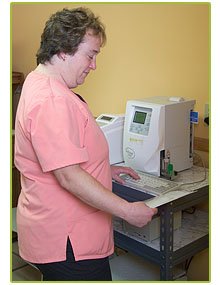
 Laboratory Testing
Laboratory Testing